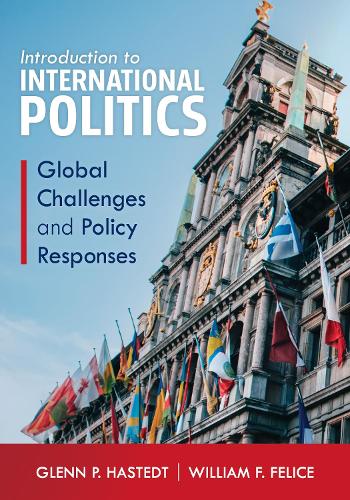
Introduction to International Politics: Global Challenges and Policy Responses
(Paperback)
Publishing Details
Introduction to International Politics: Global Challenges and Policy Responses
By (Author) Glenn P. Hastedt
By (author) William F. Felice
Bloomsbury Publishing PLC
Rowman & Littlefield Publishers
19th August 2019
United States
Classifications
Tertiary Education
Non Fiction
327
Physical Properties
Paperback
408
Width 191mm, Height 235mm, Spine 16mm
649g
Description
Introduction to International Politics makes systematic linkages between theory and policy that do not ignore or slight the conceptual discussion of international relations or simply chase newspaper headlines. Chapters are organized around Global Challenges and Policy Responses. The challenges are presented as concrete policy problems relevant to the theme of the chapter. The discussion of responses emphasize concrete actions taken or proposed by international organizations, the foreign policies of key states, international agreements, and actions taken by NGOs. Theoretical insights are used to help students understand challenges, think about solutions, and learn from the past.
Based on a combined fifty years of classroom teaching, Hastedt and Felice possess the uncanny ability to boil down complex ideas and make them meaningful for students. Written in a style that is direct and accessible, Introduction to International Politics offers a concise foundation for any introductory-level student taking an international relations or world politics course.
The text offers students a full suite of pedagogical features and learning aids, including a box program consisting of Policy Spotlights, Theory Spotlights, and Regional Spotlights. Each chapter opens with a Historical Perspective case study of a policy challenge, and closes with a related Contemporary Perspectivecase study of a similar challenge. Chapter study aids include learning objective at the outset, with a list of key terms and critical thinking questions provided at the end.
A full suite of teaching and learning ancillaries include a companion website with self-study quizzes, a test bank, testing software, PowerPoint lecture slides that are WCAG 2.0-compliant, and an E-book with links to the companion website.
Reviews
This is an effective framework. Most instructors want students to grow in terms of familiarity with the major contours and debates of international politics. They also typically seek to create better citizens, or adults who can evaluate new situations and make informed voting and other choices based upon that assessment. The challenges and responses framework is a useful way to present that type of information alongside academic theories. -- Jacob Shively, University of West Florida
The strength of the book is its linkage of theory and policy. Too many IR books speak about abstract theories with little connection to empirical realities. Students become engaged when we teachers and our courses link theory and policy, especially policy choices and their consequences. -- Timothy J. White, Xavier University
The book offers a complete and comprehensive overview of the main actors and processes in the international system, presented in an engaging way for the modern college student. -- Leslie Baker, Mississippi State University
A real focus on current issues, grounded in actual theory and pedagogy. Lots and lots of real-world examples, used correctly. It discusses the major -isms without getting bogged down in them. -- Andrew Kirkpatrick, Christopher Newport University
Introduction to International Politics takes a classic approach to organizing the field with a focus on contemporary problems and challenges. Terms seem well defined and examples are solid. It is nicely put together. -- Brian Urlacher, University of North Dakota
The overall framework is quite good and allows for a deeper engagement into the specific chapter topics. -- Austin Trantham
Author Bio
Glenn P. Hastedt is professor and chair of the justice studies department at James Madison University. He is the author of twelve editions of American Foreign Policy: Past, Present, Future. Hastedt has served as coeditor of White House Studies and is on the editorial board of Intelligence and National Security.
William F. Felice is professor of political science at Eckerd College. He was named the 2006 Florida Professor of the Year by the Carnegie Foundation for the Advancement of Teaching. Felice is the author of The Ethics of Interdependence: Global Human Rights and Duties, The Global New Deal: Economic and Social Human Rights in World Politics, and numerous articles on the theory and practice of human rights.
